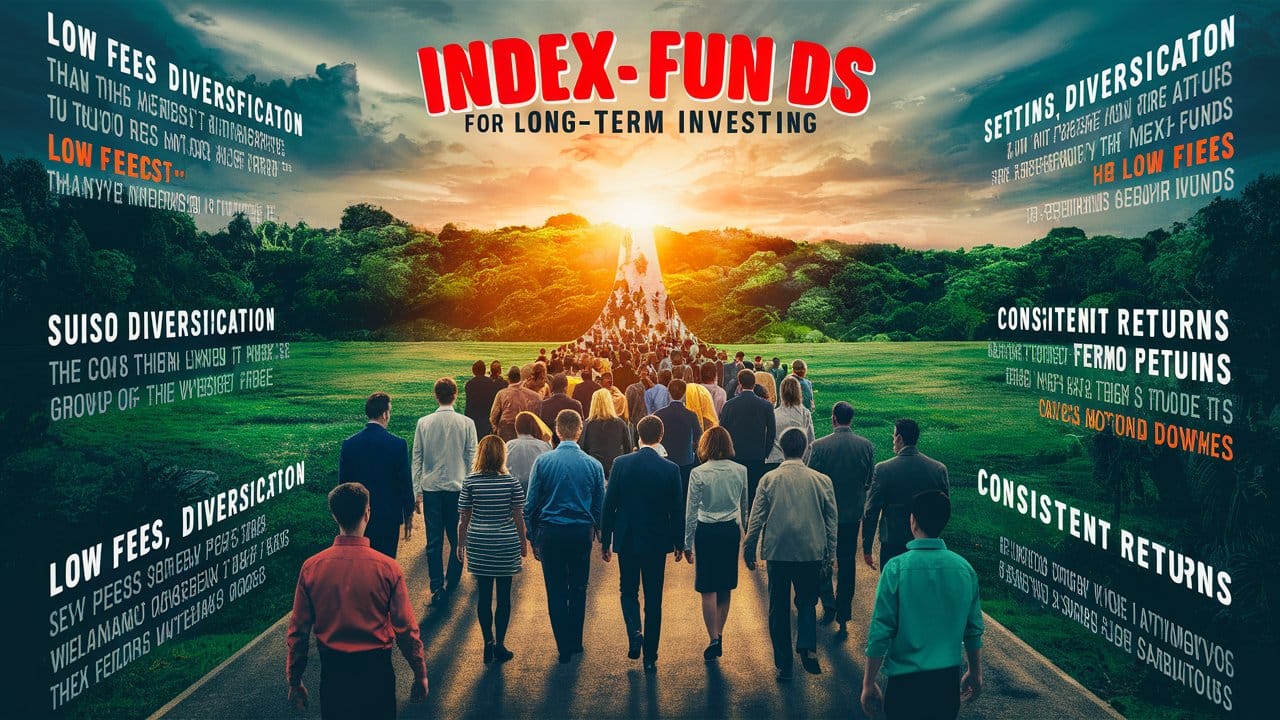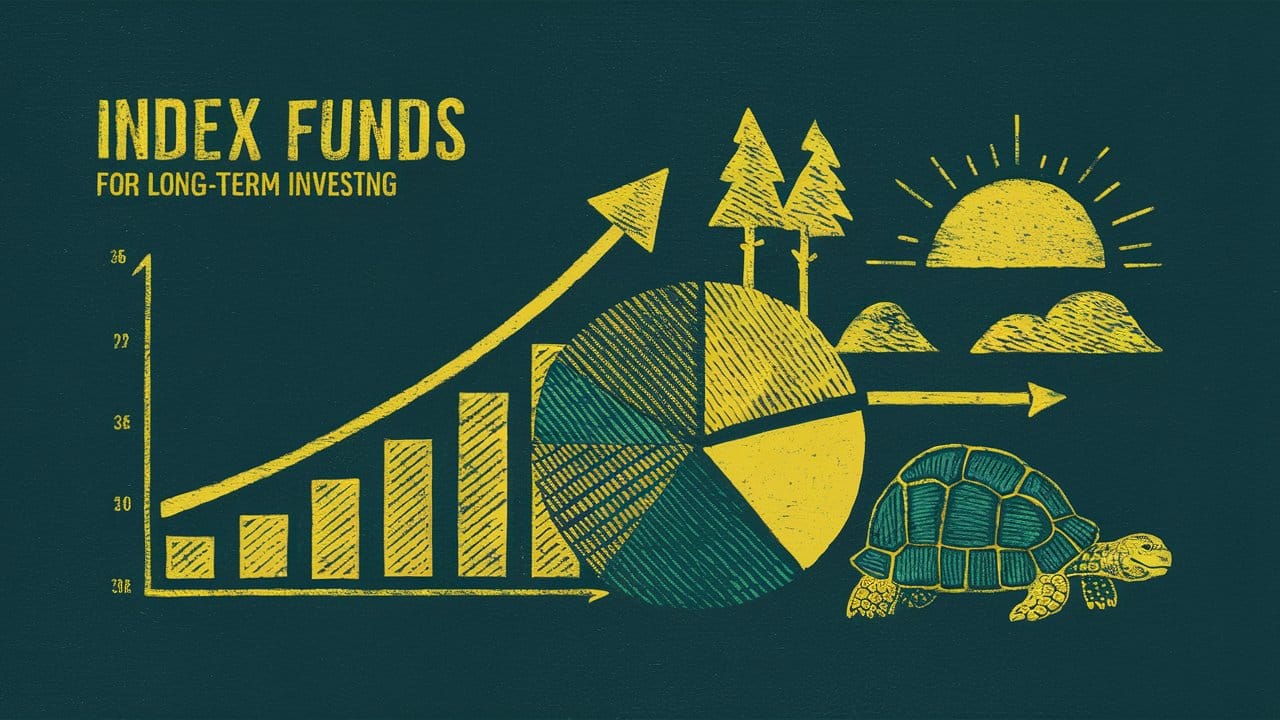The Benefits of Index Funds for Long-Term Investing
discover the benefits of index funds for long-term investing. Learn how diversification, low costs, and consistent performance can enhance your portfolio

- Introduction
- What Are Index Funds?
- How Index Funds Work
- Examples of Popular Index Funds
- Critical Benefits of Index Funds
- Why Diversification Matters in Long-Term Investing
- Comparison of Index Funds vs. Actively Managed Funds
- How to Start Investing in Index Funds
- Common Misconceptions About Index Funds
- Case Studies and Real-Life Examples
- Comparisons of Different Investment Strategies
- Conclusion
- FAQs
Introduction
Investing can be intimidating, especially with the myriad of options available. However, one investment vehicle that has consistently proven beneficial for long-term investors is the index fund. Index funds offer a blend of simplicity, low cost, and reliable performance, making them an attractive choice for novice and experienced investors. In this article, we'll delve into index funds, their benefits, and why they should be a cornerstone of your long-term investment strategy.
What Are Index Funds?
Index funds are a type of mutual fund or exchange-traded fund (ETF) designed to replicate the performance of a specific market index, such as the S&P 500. These funds aim to match the returns of the chosen index by holding all, or a representative sample, of the securities within that index.
For instance, an S&P 500 index fund will invest in the 500 companies listed in the S&P 500 index. The fund aims to mirror the index's performance by giving investors broad market exposure.

How Index Funds Work
Index funds operate on a passive management strategy. Unlike actively managed funds, where fund managers make specific investment decisions to outperform the market, index funds aim to match the performance of their benchmark index. This passive approach results in lower operational costs and management fees.
Examples of Popular Index Funds
- Vanguard 500 Index Fund (VFIAX): Tracks the S&P 500 index.
- Schwab Total Stock Market Index Fund (SWTSX): Tracks the entire US stock market.
- SPDR S&P 500 ETF (SPY): An ETF that tracks the S&P 500 index.
Critical Benefits of Index Funds
Diversification
Diversification is a fundamental principle of investing aimed at reducing risk by spreading investments across various assets. Index funds offer diversification by holding a broad range of securities within a single fund. This diversification helps mitigate the risk associated with individual securities.
For example, an investor in an S&P 500 index fund gains exposure to 500 different companies across various sectors, reducing the impact of poor performance by any single company.
Why Diversification Matters in Long-Term Investing
Over the long term, diversified portfolios tend to experience less volatility and more stable returns. Investing in a wide range of assets makes investors less susceptible to market fluctuations affecting individual securities.
Low Costs
One of the most significant advantages of index funds is their low cost. Because they follow a passive investment strategy, the operational expenses and management fees are much lower than those of actively managed funds.

Comparison of Index Funds vs. Actively Managed Funds
Actively managed funds require fund managers to constantly research, select, and trade securities to outperform the market, which incurs higher costs. These costs are often passed on to investors through higher expense ratios. In contrast, index funds replicate the performance of an index, resulting in lower fees.
Impact of Low Fees on Long-Term Returns
Lower fees mean more of your investment remains in the fund, compounding over time. This can significantly enhance long-term returns, as even slight differences in fees can add up over decades.
Consistent Performance
Index funds have a track record of delivering consistent performance over the long term. By mirroring the market, they perform well during market upswings and downturns.
Historical Performance of Index Funds
Historically, broad market indexes like the S&P 500 have delivered average annual returns of about 7-10%. While past performance does not indicate future results, index funds have consistently outperformed many actively managed funds over extended periods.
Comparison with Actively Managed Funds
Studies have shown that most actively managed funds fail to outperform their benchmark indexes over the long term. The higher costs and risks associated with active management often result in lower net returns for investors.
Simplicity and Convenience
Investing in index funds is straightforward. Unlike picking individual stocks or actively managed funds, where thorough research and ongoing monitoring are required, index funds offer a set-it-and-forget-it approach.
Ease of Investing in Index Funds
Investors can easily purchase index funds through brokerage accounts, retirement accounts, or directly from fund providers. Many brokers offer automated investment services, allowing investors to automatically set up regular contributions and reinvest dividends.
Minimal Management Required
Once invested in an index fund, there's little need for active management. The fund will automatically adjust its holdings to match the performance of the underlying index, requiring minimal intervention from the investor.
Tax Efficiency
Index funds are also known for their tax efficiency. Because they follow a passive investment strategy, there is less frequent buying and selling of securities, resulting in fewer taxable events.
Explanation of Tax Advantages
Lower turnover rates in index funds mean fewer capital gains distributions, which can lead to lower tax liabilities for investors. This tax efficiency is particularly beneficial for investors in higher tax brackets or those holding investments in taxable accounts.
How Index Funds Can Help in Tax Planning
Investors can strategically use index funds in tax-advantaged accounts like IRAs or 401(k)s to maximize their tax benefits. Additionally, holding index funds in taxable accounts can help minimize the impact of taxes on investment returns.

How to Start Investing in Index Funds
Choosing the Right Index Fund
Selecting the right index fund depends on investment goals, risk tolerance, and time horizon. Consider factors like the fund's expense ratio, the index it tracks, and its historical performance.
Setting Up an Investment Account
You'll need to open an investment to start investing in index funds. This can be a brokerage account, a retirement account (IRA, 401(k)), or an account with a fund provider like Vanguard or Fidelity.
Tips for Regular Contributions
Consistency is critical to long-term investing success. Set up automatic contributions to your index fund to take advantage of dollar-cost averaging, which helps smooth out the effects of market volatility.
Common Misconceptions About Index Funds
Myth 1: Index Funds Are Only for Beginners
While index funds are an excellent choice for novice investors, they are also widely used by experienced investors and professionals due to their low costs, diversification, and consistent performance.
Myth 2: Index Funds CCan'tBeat the Market
Index funds are designed to match, not beat, the market. However, their low costs and broad diversification often result in better long-term performance than many actively managed funds.
Myth 3: All Index Funds Are the Same
Not all index funds are created equal. Different funds track different indexes and may have varying expense ratios and management practices. RIt'srching and choosing a fund that aligns with your investment goals is essential.
Providing Factual Information
It's crucial to rely on visible sources and data to dispel these myths. Numerous studies and historical data support the benefits of index funds for long-term investing.
Case Studies and Real-Life Examples
Success Stories of Long-Term Investors Using Index Funds
Consider the story of John Bogle, the founder of Vanguard, who popularized index fund investing. BoBogle's advocacy for low-cost, passive investing has helped millions of investors achieve their financial goals.
Comparisons of Different Investment Strategies
A comparison of an investor who regularly contributes to an index fund versus one who attempts to time the market reveals that the former often achieves better long-term results. The consistency and lower costs of index fund investing typically outperform the high costs and risks associated with market timing.
Conclusion
Index funds offer many benefits for long-term investors, including diversification, low costs, consistent performance, simplicity, and tax efficiency. You can build a robust and resilient portfolio by understanding these advantages and incorporating index funds into your investment strategy. Start investing today and take control of your financial future with index funds.
FAQs
1. What is the primary benefit of investing in index funds? The primary benefit is diversification, which reduces risk by spreading investments across various securities.
2. Are index funds suitable for long-term investment? Index funds are ideal for long-term investment due to their low costs, consistent performance, and simplicity.
3. How do index funds compare to actively managed funds? Index funds generally have lower fees and often outperform actively managed funds over the long term.
4. Can index funds help with tax efficiency? Index funds are tax-efficient due to their passive management style, resulting in fewer taxable events.
5. How can I start investing in index funds? You can start by opening an investment account with a brokerage or fund provider and choosing an index fund that aligns with your investment goals.




